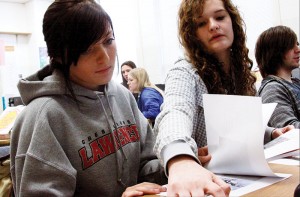
As the school year is winding down, some students are having to amp up the work rate.
Students who chose to take Advanced Placement classes are starting to think about the AP exams that are looming just around the corner, with tests spanning the weeks of May 6 and 13.
“I’m probably most nervous about remembering all the information we learned in first semester,” junior Kayla Duncan said. Duncan is in Valerie Schrag’s AP U.S. History class and will be taking her first AP exam.
Teachers play a large part in helping students prepare for the exams, starting with the coursework of the class.
“The first preparation is to make sure that my course all year long reflects the AP exam, so we have been working since August with the different components of the AP U.S. exam to make sure they’re familiar with that format early on,” Schrag said. “My tests are of a caliber that is similar to the AP exam, so that’s the first thing that I do.”
AP Calculus teacher Pam Fangohr takes a similar approach to initially preparing her students.
“We start doing practice AP questions on tests as soon as we have covered that concept,” Fangohr said. “I feel [students benefit the most from] practicing AP questions as soon as you can because of the way questions are worded on the exam.”
Senior Kylie Seaman took the AP Calculus AB exam and the AP U.S. History exam last year and is getting ready to take the AP Calculus BC and AP Literature and Composition exams this year.
Seaman’s test taking preparation last year hinged on help provided from her teachers.
“Both [Fangohr and Schrag] helped me outside of class whenever I needed it. Ms. Schrag let me go in her room and use her computer to do practice multiple choice questions on several occasions,” Seaman said. “Both of them provided a ton of practice materials and helped me understand the things I did wrong.”
Both Fangohr and Schrag have been teaching AP classes for about eight years, so they’ve had time to realize what works and what doesn’t when it comes to preparing for these exams.
“The biggest thing I can do is hold them to the AP caliber all year, that’s the best long-term prep so you know what to expect,” Schrag said. “The second thing is that every year after spring break we host review sessions.”
Schrag’s review sessions take place on Mondays after school, with each session covering a different era of AP U.S. history. “We start with the early stuff that is the most cloudy and foggy and cobwebby, and then we move to the present,” Schrag said.
Fangohr takes a similar approach of reviewing, providing students a packet of multiple choice questions over winter and spring break and assigning two free response questions beginning every Friday in January.
“A few upperclassmen had strongly advised me to attend Ms. Schrag’s AP reviews,” Duncan said. “I am attending the review sessions as well as studying over the weekends a good few hours.”
No matter how much the teachers do to try to prepare their students for the exams, there is only so much they can do. At some point, students must take matters into their own hands, and there are several ways for students to be successful studying on their own outside of class.
“I would say one of the first things is to have a regularly scheduled, dedicated study and review time,” Schrag said. “If you work well with other people, and you don’t go off into all sorts of other odd things, then study with other people. If you know you can’t do that, then study by yourself but get yourself a dedicated time, whether it’s on the weekend or if it’s a couple of nights a week, however it works into your schedule.”
A test that is so demanding and requires so much preparation can take it’s toll on students.
“The most challenging part is definitely preparing and not letting yourself freak out when taking the exam,” Seaman said. “It is just really hard to stay focused and calm when taking a near four-hour timed test.”
It is ultimately up to students and their parents when it comes to deciding on taking the exam.
“The way I approach AP exams and taking the test or not taking the test is that it’s not my decision to make, it’s their decision because it’s their $87,” Schrag said.
However, Schrag noted that most of her students choose to take the exam because it’s what they’ve been working toward the whole year, and it’s somewhat of an expectation of the course from the beginning, even though it is not required.
“Studying hard and doing all the extra hours of homework would be pointless if I had not decided to take the exam,” Duncan said. “I am taking the exam to test my knowledge I learned throughout the year and to try and earn the college credits.”
Fangohr said that while every year is different, most of her students have done very well on the AP exam, allowing them to get college credit. Most colleges require a score of 3 or above on a 1-5 scale in order to earn credit.
Whether it’s math or English, science or social studies, art or foreign languages, taking an AP course and exam can be a rewarding experience.
“When you’ve finished with the test, the feeling of accomplishment is amazing; it’s worth it,” Schrag said. “That feeling of accomplishment is hard to replicate anywhere else.”


